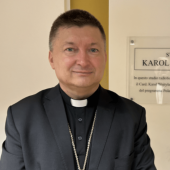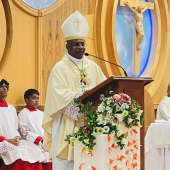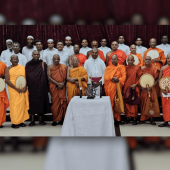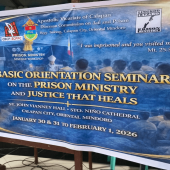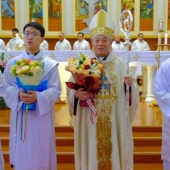Sri Lanka faces worst financial, political crises
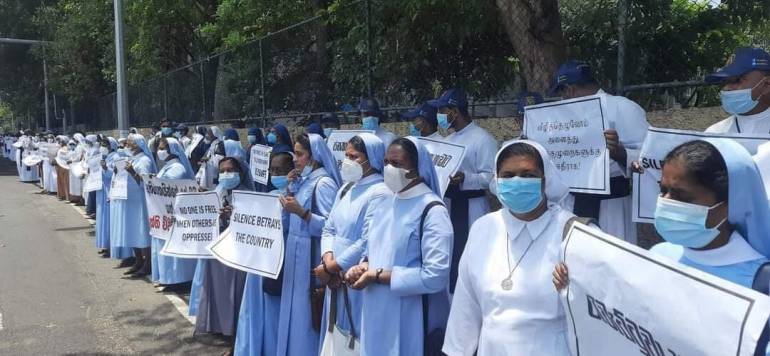
Sri Lanka is witnessing its worst financial and political crises, says a priest from the Archdiocese of Colombo.
“Sri Lanka is facing an economic, social, and political crisis like never before since its independence from Britain in 1948,” Father Hemantha Udaya Kumara Perera, told RVA News.
As never before, the entire population of Sri Lanka is taking to the streets in a massive protest against the government, said the priest, who is assigned at St. Therese of Avilla Church, Kotikawatte, Wellampitiya, Sri Lanka.
According to him, most protesters emphasize with one voice that President Gotabaya Rajapaksa must resign and return the national wealth stolen by the Rajapaksas from the people.
“The Rajapaksa-led government came to power in 2019 with several promises including those involved in the Easter attacks (2019) would be brought to justice. Because of this, Sri Lankans trusted them and gave the government a two-thirds majority mandate,” said Perera.
“But did the people achieve the objectives of the Gotabhaya Rajapaksa government?” he asked.
President Gotabaya and his brother Prime Minister Percy Mahinda Rajapaksa “fooled the people and inherit an unbearable burden on the people,” said Perera.
After winning the election in 2019, the president dissolved the legislature and filled the government with relatives and cronies. Soon after the parliamentary elections with the majority in 2022, he changed the constitution which gave him more power.
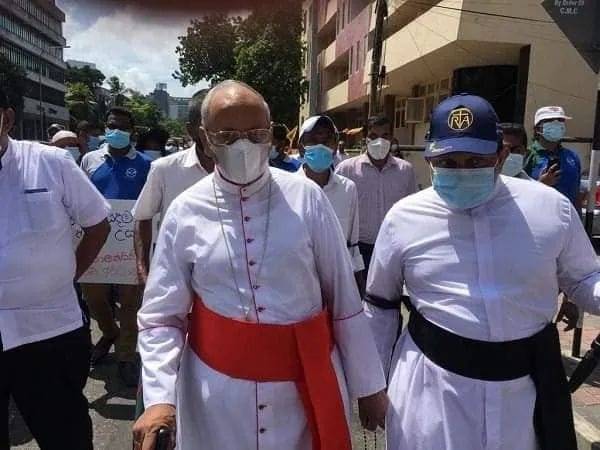
A thumping win for his coalition in parliamentary elections in 2020 enabled him to change the constitution, handing himself even more power.
However, in recent weeks, the country’s economy is in free fall. Sri Lanka’s rupee has depreciated by more than 30% against the dollar. Food and fuel supply have been in disarray.
In the opinion of many commentators, the catastrophe was paved by the abrupt cessation of chemical fertilizers by the government last year, forcing people to use organic fertilizers.
The effect was to lose even more than the right amount of harvest from last season's crop. Due to this, the prices of food items went up rapidly. As a result, all the farmers whose crops were damaged took to the streets. They began to protest with one voice against the government.
Opposition parties have stated they will not run in the by-elections, but have said they will not use chemical fertilizers if they want to. It did not take long for the people to realize that their statement was true.
The reason for this was the sudden shortage of milk powder, gas, and fuel in Sri Lanka, an island nation of 22 million, which heavily depends on tourism.
Ships arriving at the port could not be released. That's because there are no dollars.
The price of a gas cylinder ranged from Sri Lanka rupees 1,200 (US$ 381) to 4,200 (US$ 13.33) a bag of cement from rupees 900 (US$ 2.86) to 1275 (US$ 4.05).
A liter of petrol went up by rupees 283 (US$ 0.93) and a liter of diesel by rupees 254 (US$ 0.81).
In addition, the 13-hour power cut in the country due to the shortage of dollars has taken a heavy toll on people's lives. The government also had to postpone examinations due to the inability to import paper on account of the dollar shortage. Hospitals across the country lack essential drugs.
When all these persecutions became too much for the people to bear, anti-government and anti-government posts were exchanged on social media, which later became known as 'Go Gota go home', forcing the President to step down. People in the Mirihana area who have been affected by the cost have recently taken to the streets against the President.
At first, the peaceful protest later turned into a massive tsunami. Clashes broke out between security forces and protesters damaging state and public properties.
Police were arrested by the police and had been a group of over three hundred lawyers appeared for free.
In addition, the government imposed a curfew last Sunday (April 3) to stop a massive protest organized on social media and blocked social media from morning to evening.
But the people of Sri Lanka did not heed the curfew and took to the streets to protest peacefully against the government, and religious leaders and scholars came forward without hesitation to participate in protests, said Father Perera.
“Protests against the current government, led by the President, are intensifying and more and more people are rallying with the pure intention of making Sri Lanka a prosperous country free from fraud and corruption and passing it on to the next generation,” he added.
Radio Veritas Asia (RVA), a media platform of the Catholic Church, aims to share Christ. RVA started in 1969 as a continental Catholic radio station to serve Asian countries in their respective local language, thus earning the tag “the Voice of Asian Christianity.” Responding to the emerging context, RVA embraced media platforms to connect with the global Asian audience via its 21 language websites and various social media platforms.









